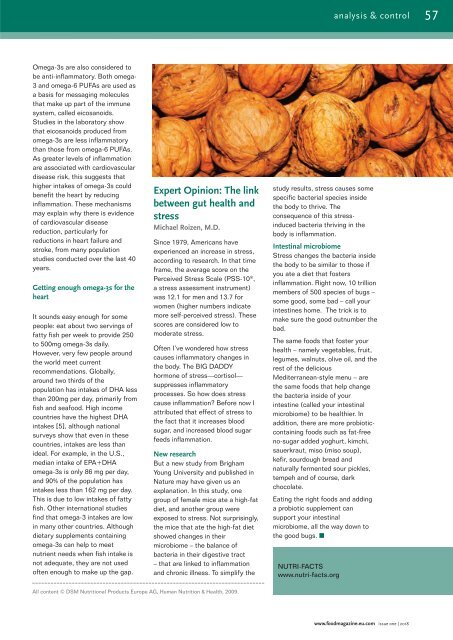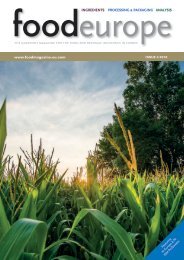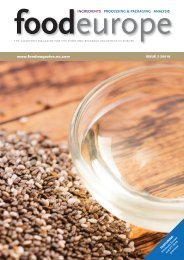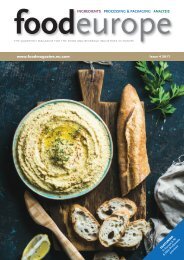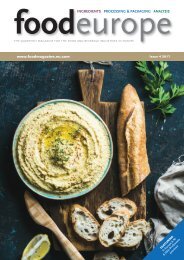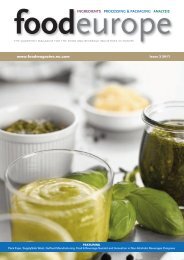Issue_1_2018
Create successful ePaper yourself
Turn your PDF publications into a flip-book with our unique Google optimized e-Paper software.
analysis & control 57<br />
Omega-3s are also considered to<br />
be anti-inflammatory. Both omega-<br />
3 and omega-6 PUFAs are used as<br />
a basis for messaging molecules<br />
that make up part of the immune<br />
system, called eicosanoids.<br />
Studies in the laboratory show<br />
that eicosanoids produced from<br />
omega-3s are less inflammatory<br />
than those from omega-6 PUFAs.<br />
As greater levels of inflammation<br />
are associated with cardiovascular<br />
disease risk, this suggests that<br />
higher intakes of omega-3s could<br />
benefit the heart by reducing<br />
inflammation. These mechanisms<br />
may explain why there is evidence<br />
of cardiovascular disease<br />
reduction, particularly for<br />
reductions in heart failure and<br />
stroke, from many population<br />
studies conducted over the last 40<br />
years.<br />
Getting enough omega-3s for the<br />
heart<br />
It sounds easy enough for some<br />
people: eat about two servings of<br />
fatty fish per week to provide 250<br />
to 500mg omega-3s daily.<br />
However, very few people around<br />
the world meet current<br />
recommendations. Globally,<br />
around two thirds of the<br />
population has intakes of DHA less<br />
than 200mg per day, primarily from<br />
fish and seafood. High income<br />
countries have the highest DHA<br />
intakes [5], although national<br />
surveys show that even in these<br />
countries, intakes are less than<br />
ideal. For example, in the U.S.,<br />
median intake of EPA+DHA<br />
omega-3s is only 86 mg per day,<br />
and 90% of the population has<br />
intakes less than 162 mg per day.<br />
This is due to low intakes of fatty<br />
fish. Other international studies<br />
find that omega-3 intakes are low<br />
in many other countries. Although<br />
dietary supplements containing<br />
omega-3s can help to meet<br />
nutrient needs when fish intake is<br />
not adequate, they are not used<br />
often enough to make up the gap.<br />
Expert Opinion: The link<br />
between gut health and<br />
stress<br />
Michael Roizen, M.D.<br />
Since 1979, Americans have<br />
experienced an increase in stress,<br />
according to research. In that time<br />
frame, the average score on the<br />
Perceived Stress Scale (PSS-10 ® ,<br />
a stress assessment instrument)<br />
was 12.1 for men and 13.7 for<br />
women (higher numbers indicate<br />
more self-perceived stress). These<br />
scores are considered low to<br />
moderate stress.<br />
Often I’ve wondered how stress<br />
causes inflammatory changes in<br />
the body. The BIG DADDY<br />
hormone of stress—cortisol—<br />
suppresses inflammatory<br />
processes. So how does stress<br />
cause inflammation? Before now I<br />
attributed that effect of stress to<br />
the fact that it increases blood<br />
sugar, and increased blood sugar<br />
feeds inflammation.<br />
New research<br />
But a new study from Brigham<br />
Young University and published in<br />
Nature may have given us an<br />
explanation. In this study, one<br />
group of female mice ate a high-fat<br />
diet, and another group were<br />
exposed to stress. Not surprisingly,<br />
the mice that ate the high-fat diet<br />
showed changes in their<br />
microbiome – the balance of<br />
bacteria in their digestive tract<br />
– that are linked to inflammation<br />
and chronic illness. To simplify the<br />
study results, stress causes some<br />
specific bacterial species inside<br />
the body to thrive. The<br />
consequence of this stressinduced<br />
bacteria thriving in the<br />
body is inflammation.<br />
Intestinal microbiome<br />
Stress changes the bacteria inside<br />
the body to be similar to those if<br />
you ate a diet that fosters<br />
inflammation. Right now, 10 trillion<br />
members of 500 species of bugs –<br />
some good, some bad – call your<br />
intestines home. The trick is to<br />
make sure the good outnumber the<br />
bad.<br />
The same foods that foster your<br />
health – namely vegetables, fruit,<br />
legumes, walnuts, olive oil, and the<br />
rest of the delicious<br />
Mediterranean-style menu – are<br />
the same foods that help change<br />
the bacteria inside of your<br />
intestine (called your intestinal<br />
microbiome) to be healthier. In<br />
addition, there are more probioticcontaining<br />
foods such as fat-free<br />
no-sugar added yoghurt, kimchi,<br />
sauerkraut, miso (miso soup),<br />
kefir, sourdough bread and<br />
naturally fermented sour pickles,<br />
tempeh and of course, dark<br />
chocolate.<br />
Eating the right foods and adding<br />
a probiotic supplement can<br />
support your intestinal<br />
microbiome, all the way down to<br />
the good bugs. ■<br />
NUTRI-FACTS<br />
www.nutri-facts.org<br />
All content © DSM Nutritional Products Europe AG, Human Nutrition & Health, 2009.<br />
www.foodmagazine.eu.com issue one | <strong>2018</strong>


